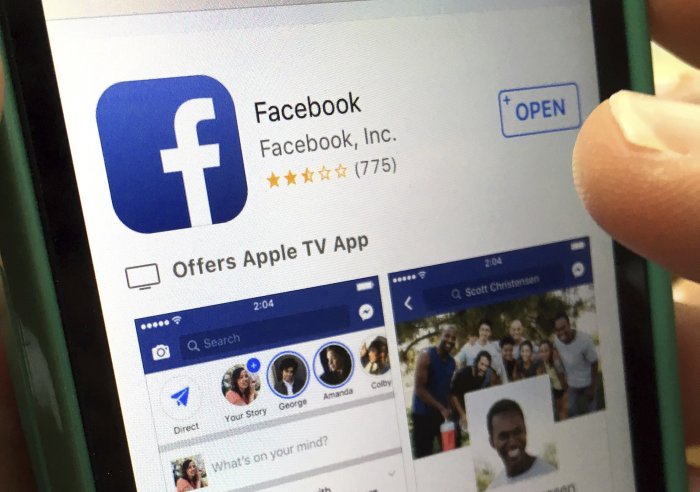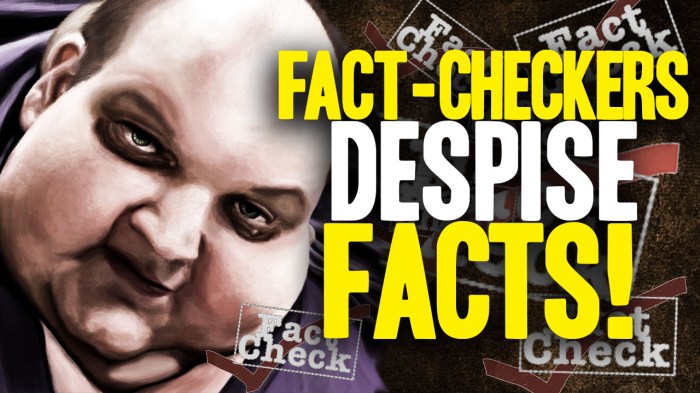Facebook fact checked related articles news feed – Facebook Fact-Checked Articles: News Feed’s New Reality – Imagine scrolling through your Facebook feed and encountering articles marked with a “Fact Check” label. It’s a reality now, and it’s raising questions about the accuracy of information shared on the platform. Facebook’s fact-checking system is designed to combat misinformation by partnering with independent fact-checking organizations to verify the truthfulness of articles and posts. These fact-checkers analyze content, identify potential inaccuracies, and label articles with their findings, providing users with a more informed view of the information they encounter.
The impact of fact-checking on Facebook is undeniable. It aims to reduce the spread of false information and promote a more reliable news environment. But the system isn’t without its challenges. The effectiveness of fact-checking is constantly debated, and there’s a concern about potential bias and the potential for fact-checking to create polarization. It’s a complex issue with no easy answers.
Facebook’s Fact-Checking System
Facebook’s fact-checking system is a crucial part of the platform’s efforts to combat the spread of misinformation. It aims to ensure that users encounter accurate and reliable information, especially on sensitive topics. This system works by partnering with independent fact-checking organizations around the world.
How Facebook’s Fact-Checking System Works
The system relies on a collaborative approach between Facebook and these third-party fact-checkers. When a user reports a piece of content as potentially false, Facebook sends it to the fact-checkers. These organizations are trained to verify the information and assess its accuracy. They can then label the content as “false,” “partly false,” or “missing context.” Facebook then uses this information to display warnings and reduce the visibility of the flagged content.
Types of Fact-Checks Facebook Performs
Facebook’s fact-checking system covers a wide range of content types, including:
- News articles: Fact-checkers analyze articles from various sources, including news websites, blogs, and social media posts, to determine their accuracy.
- Images and videos: The system also checks the authenticity of images and videos, identifying manipulated or misleading content.
- Social media posts: Fact-checkers review posts shared on Facebook, including text, images, and videos, to verify their claims.
Examples of Fact-Checked Content on Facebook
Here are some examples of fact-checked content on Facebook:
- False claims about the COVID-19 vaccine: Fact-checkers have debunked numerous false claims about the safety and effectiveness of the COVID-19 vaccine, helping to combat vaccine hesitancy.
- Misleading information about political events: Fact-checkers have addressed false or misleading information about elections, political campaigns, and other events, promoting a more informed public discourse.
- Fabricated news stories: The system has helped to identify and label fabricated news stories, which are often designed to spread misinformation and manipulate public opinion.
The Impact of Fact-Checking on Facebook
Facebook’s fact-checking system has become a crucial element in the platform’s efforts to combat the spread of misinformation. This system, which relies on partnerships with independent fact-checkers, plays a significant role in shaping the information landscape on Facebook.
The effectiveness of Facebook’s fact-checking system is a subject of ongoing debate. While the system has been credited with reducing the visibility of false content, its impact on the overall spread of misinformation is complex and multifaceted.
“The impact of fact-checking on the spread of misinformation is complex and multifaceted.”
Studies have shown that fact-checked content tends to be viewed less often and shared less frequently. However, the impact of fact-checking is not always straightforward. In some cases, fact-checking can actually backfire, leading to increased engagement with false content.
“Fact-checking can actually backfire, leading to increased engagement with false content.”
For example, a study by the Shorenstein Center on Media, Politics and Public Policy at Harvard University found that fact-checking labels on Facebook can sometimes lead to a “backfire effect,” where users who disagree with the fact-check are more likely to share the disputed content. This suggests that fact-checking alone may not be sufficient to address the problem of misinformation.
Comparison of Fact-Checking Approaches on Social Media Platforms
Facebook’s approach to fact-checking is not unique. Other social media platforms, such as Twitter and YouTube, have also implemented fact-checking systems. However, there are some key differences in the way these platforms approach fact-checking.
For example, Twitter’s fact-checking system is more focused on labeling tweets as potentially misleading, while YouTube’s system is more focused on removing videos that violate its community guidelines. Facebook’s approach, on the other hand, is more comprehensive, encompassing both labeling and demoting false content.
“Twitter’s fact-checking system is more focused on labeling tweets as potentially misleading, while YouTube’s system is more focused on removing videos that violate its community guidelines.”
- Facebook: Focuses on both labeling and demoting false content.
- Twitter: Primarily labels tweets as potentially misleading.
- YouTube: Prioritizes removing videos that violate community guidelines.
Another key difference is the role of independent fact-checkers. Facebook relies heavily on partnerships with independent fact-checkers to verify the accuracy of content. Other platforms, such as Twitter, have a more limited reliance on external fact-checkers.
“Facebook relies heavily on partnerships with independent fact-checkers to verify the accuracy of content.”
The Role of Fact-Checkers on Facebook
Fact-checkers play a crucial role in combating the spread of misinformation on Facebook. They are independent organizations that verify the accuracy of information shared on the platform, helping to ensure that users have access to reliable and trustworthy content.
Fact-Checking Organizations
Fact-checking organizations are essential for maintaining the integrity of information on Facebook. They are responsible for evaluating the truthfulness of content and labeling it as accurate, partially accurate, or false. Here are some of the organizations that conduct fact-checks for Facebook:
- PolitiFact: A Pulitzer Prize-winning fact-checking website that rates the accuracy of statements made by politicians and public figures.
- FactCheck.org: A nonpartisan, nonprofit website that aims to reduce the level of deception in U.S. politics.
- Snopes: A website dedicated to debunking urban legends, rumors, and misinformation.
- Full Fact: A UK-based fact-checking organization that focuses on verifying claims made by politicians and in the media.
- AFP Fact Check: The fact-checking arm of the Agence France-Presse, a global news agency.
Criteria for Selecting Fact-Checkers
Facebook has established a set of criteria for selecting fact-checking organizations. These criteria ensure that the chosen organizations are independent, transparent, and adhere to high journalistic standards. Here are some of the key criteria:
- Independence: Fact-checkers must be independent of any political, religious, or commercial interests that could bias their assessments.
- Transparency: Fact-checkers must clearly disclose their methodology, sources, and funding.
- Professional Standards: Fact-checkers must adhere to high journalistic standards, including accuracy, fairness, and impartiality.
- Corrections Policy: Fact-checkers must have a clear policy for correcting errors in their assessments.
- Commitment to Fact-Checking: Fact-checkers must be committed to fact-checking and have a proven track record of doing so.
Challenges Faced by Fact-Checkers
Fact-checkers on Facebook face a number of challenges in their efforts to combat misinformation. These challenges include:
- The Volume of Content: The sheer volume of content shared on Facebook makes it difficult for fact-checkers to keep up with all the potential misinformation.
- The Speed of Spread: Misinformation can spread rapidly on Facebook, making it difficult for fact-checkers to respond in a timely manner.
- The Sophistication of Misinformation: Misinformation can be increasingly sophisticated, making it more difficult to identify and debunk.
- The Difficulty of Reaching Users: Fact-checkers often struggle to reach the users who have already been exposed to misinformation.
- The Spread of Misinformation Across Platforms: Misinformation often spreads across multiple platforms, making it difficult for fact-checkers to contain its spread.
User Reactions to Fact-Checking on Facebook
Fact-checking on Facebook has become a crucial aspect of combating misinformation and promoting accurate information. However, user reactions to fact-checked content are diverse and complex. While some users appreciate the effort to combat misinformation, others react negatively, questioning the motives and methods of fact-checkers.
Potential for Polarization
Fact-checking can inadvertently contribute to polarization on Facebook by reinforcing existing biases and creating echo chambers. When users encounter fact-checked content that contradicts their beliefs, they may dismiss it as biased or part of a larger conspiracy. This can lead to increased distrust in credible sources and further solidify pre-existing viewpoints. For instance, a study by the Pew Research Center found that Americans who identify as politically conservative are significantly more likely to distrust fact-checking organizations than those who identify as liberal. This polarization can be exacerbated by the algorithms that Facebook uses to personalize content, which can lead users to encounter information that aligns with their existing beliefs, creating echo chambers where misinformation can flourish.
The Future of Fact-Checking on Facebook: Facebook Fact Checked Related Articles News Feed
Facebook’s fact-checking system is constantly evolving, and the future holds exciting possibilities for improving accuracy, transparency, and user engagement. As technology advances and the information landscape becomes increasingly complex, the role of fact-checking on Facebook will continue to grow.
The Role of Artificial Intelligence in Fact-Checking
Artificial intelligence (AI) has the potential to revolutionize fact-checking on Facebook. AI algorithms can analyze vast amounts of data, identify patterns, and detect inconsistencies much faster than humans. This can be invaluable in identifying false or misleading content, particularly in areas like automated misinformation campaigns or complex scientific claims. AI can also be used to develop more sophisticated fact-checking tools, such as automated fact-checkers that can analyze text, images, and videos for potential inaccuracies.
Improving Accuracy and Transparency
To ensure the accuracy and transparency of Facebook’s fact-checking system, several improvements can be implemented:
- Expanding the Network of Fact-Checkers: Collaborating with a wider range of fact-checking organizations, including those from different countries and languages, will improve coverage and reduce bias.
- Developing Clearer Fact-Checking Guidelines: Providing detailed guidelines for fact-checkers will ensure consistency in their assessments and reduce the risk of subjective interpretations.
- Increasing Transparency in Fact-Checking Processes: Making the process of fact-checking more transparent, by clearly explaining the criteria used and the evidence considered, will build trust in the system.
- User Feedback Mechanisms: Incorporating mechanisms for users to provide feedback on fact-checked content will allow for continuous improvement and address potential inaccuracies.
Facebook’s fact-checking system is a dynamic and evolving process. The platform is continuously adapting its approach to address the challenges of misinformation and ensure a more reliable news feed. As technology advances, the role of artificial intelligence in fact-checking is expected to grow, potentially revolutionizing how we consume and verify information online. The future of fact-checking on Facebook is a journey towards a more informed and trustworthy digital landscape, but it’s a journey that requires constant vigilance and open dialogue.
Scrolling through your Facebook feed, you might see fact-checked articles about the latest trends, but sometimes those articles can lead you down a rabbit hole. For example, you might stumble upon a news story about a data breach, like the recent incident involving India’s ICICI Bank exposing credit cards. While it’s important to stay informed, remember to always verify information from multiple sources and be wary of sensationalized headlines.
 Standi Techno News
Standi Techno News

